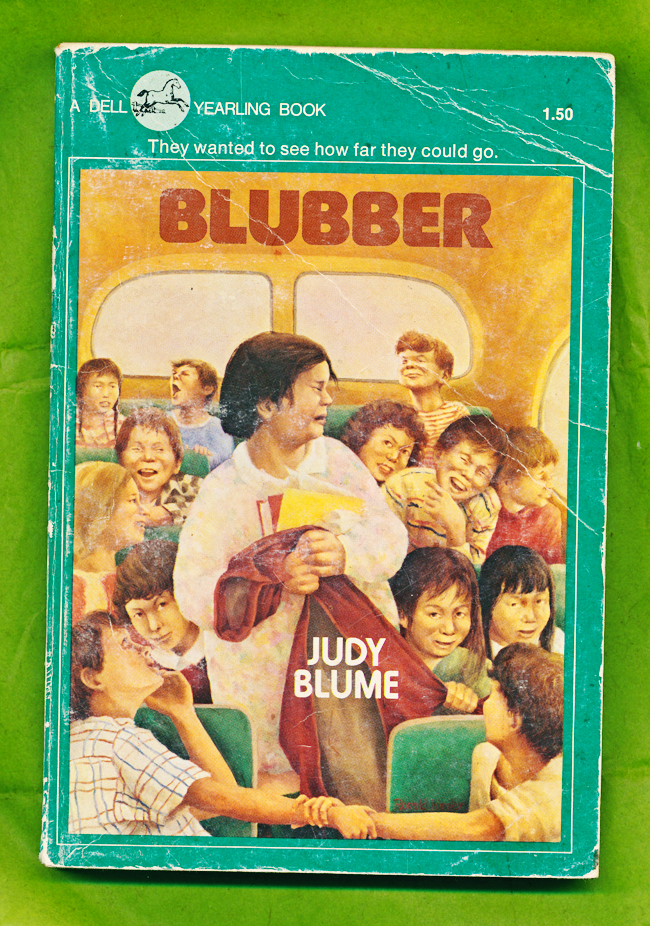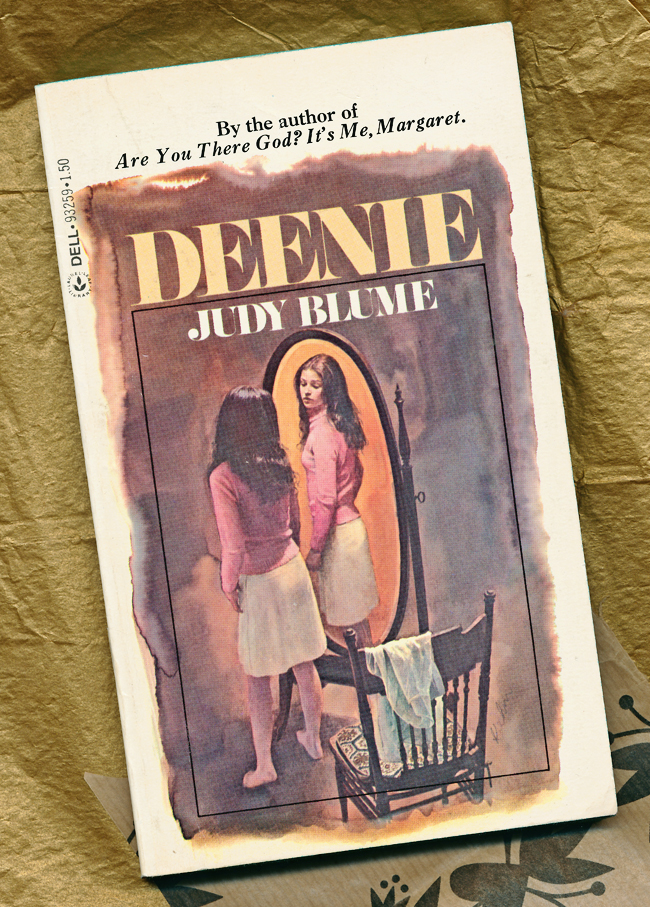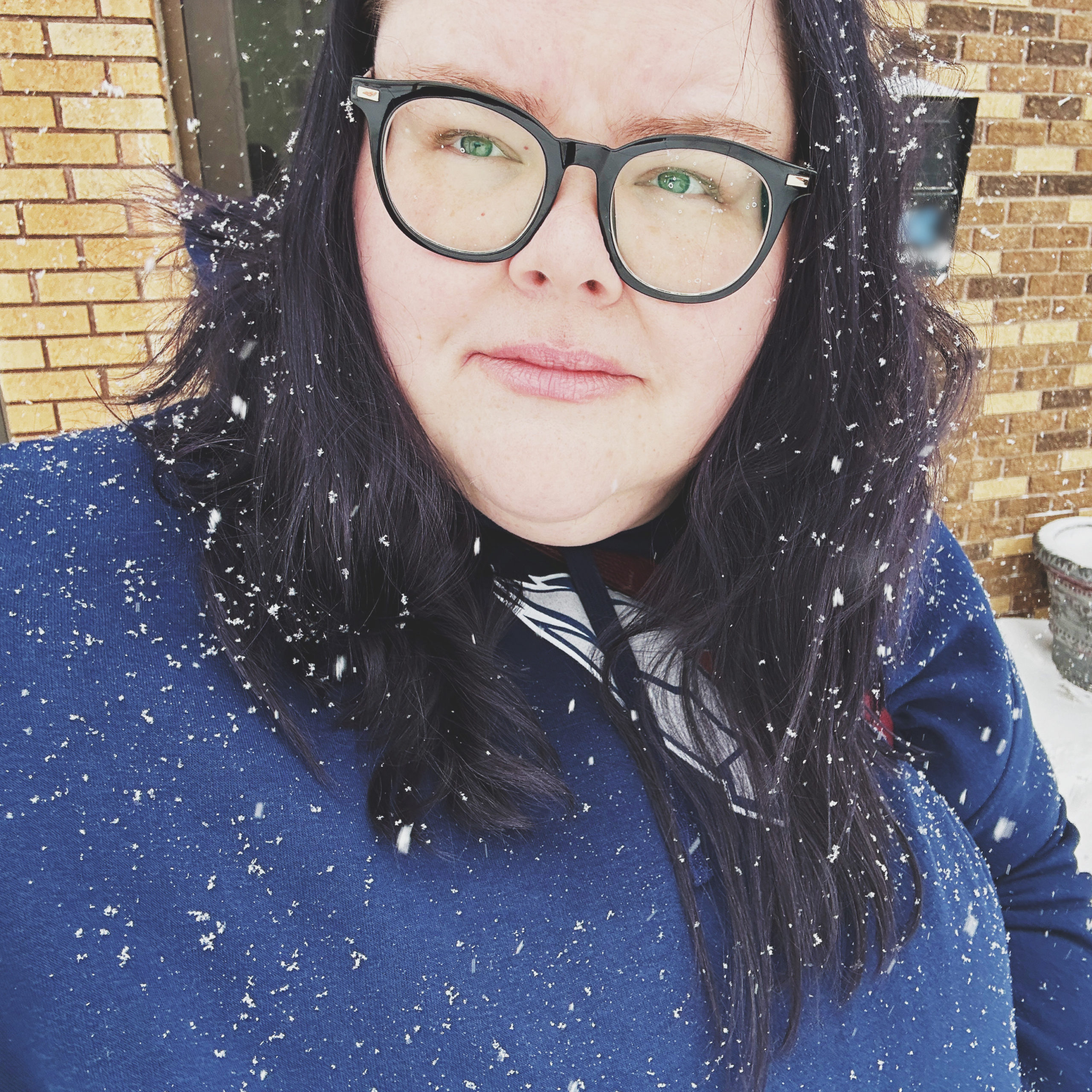|
|
I am missing Disneyland today.*

Well, to be fair, I am never not missing Disneyland, but today is wielding a particularly powerful ache for it around my ribs. Sort of haunting and cold and sad.
 
This is partially because I spent a couple of hours last night reading posts about Disney projects that never came to fruition in their original forms — Port Disney, WESTCOT Center, Disney’s America, and The SS Disney — and partially because I am just a person who is subject to flights of whimsy, nostalgia, and misery.
 » more: an overlong ode to disneyland
» more: an overlong ode to disneyland
OKAY. I’ve put this off for too long and I can’t take it anymore. I want to wrap up my Back to School with Judy Blume project before I forget everything about all eight of the books I read last month. I put it off because this is my 100th post! And I wanted to figure out a way to celebrate that! And probably give away some free shit!* But I came up with absolutely nothing. So here we are instead.
 I spent my September getting emotionally educated by the inimitable Judy Blume and eight of her teen and pre-teen protagonists. I learned some stuff! And I remembered some stuff! And I shared a whole bunch of personal details that probably no one in their right mind ever needed! That was my favorite part though, let’s be real.
Most of all, though, what I learned/remembered is that books are important. Books are important. Writing for young adults is profoundly important. If there’s one thing from my adolescence that most shaped me as a person it was reading, reading, reading, all the time, anywhere, at any moment. I always had a book in my bag and I probably actually started carrying a bag with me because I needed somewhere to put whatever book I wanted to carry around with me.
I had always been a big reader, since I learned to read (at four, my mother wanted me prepared for kindergarten) but my eighth grade English teacher was a particularly valuable element in my quest for the written word. She gave me Fahrenheit 451 and a slew of other books that changed me as a reader, made me more open, made me more aware, and made me better. She gave me Chris Crutcher and Robert Cormier. She gave me Roll of Thunder, Hear My Cry. And, had I been a bit younger or bit less obnoxious/aggressive as a human being, I think she probably would’ve given me Judy Blume too. She gave me access to the incredible library she’d built in her classroom and she took me seriously when I came to her to ask for more. (Hell, she even took me seriously when I did lyrical analysis of a Korn song.) She was a phenomenal teacher and an incredibly important part of my youth. She believed books and stories were important and she made sure that reading stayed with me, that school didn’t dig it out of me. I wouldn’t be a writer now, had she not nurtured me as a reader. I wouldn’t have an MFA. I wouldn’t tell stories. And without telling stories, without writing, I don’t know where I’d be. Thanks, Mrs. Wells.
Books are important. And going back to school with Judy Blume taught me why: We need to know we’re not alone. And Judy Blume is important because she wants young women — young people, but young women especially — to know that to their absolute core, to know in their hearts that no matter how isolated they feel or how weird they think they are, they are not alone.
It sounds like such a simple thing, but I think it’s one of the Great Purposes of Writing and it’s one for which I strive desperately. Why else would I share each and every thought that flitters across my consciousness? Why else would I blog? Why else would I read blogs? As much as I love reading stories and experiences that are unique to each of the people I follow, I think the medium transcends when you have a moment of “Oh! Oh, yes! Me too.” And I don’t really think books are all that different.
And Judy Blume’s books excel at those moments, they revel in them, they both whisper and shout them at readers. From being the subject of childhood cruelty to figuring out how your genitals work, Judy Blume is there to say, “Hey, you’re not a weirdo! There are lots and lots of us just like you!” And no matter how dated the details may be — sanitary napkin belts and Milwaukee braces that would never make it through a TSA checkpoint — that heartfelt relatability is the core of what makes Judy’s stories successful and timeless.
Being a kid — particularly one between 10 and 16 — is just horrid. It’s ugly and confusing and scary. Not just in a puberty way — zits and pubic hair and periods and boners are all weird, but we survive — but in a “I have no idea how to be a human being” way. You want to be cool and you want to be liked and you’re constantly struggling with desperately wanting to be older and not wanting it at all. It’s years of genuine misery and confusion, longer if you’re not lucky, and it all sucks so much. Adolescence will always be those things — gross and weird and scary and confusing — but lucky for lots of us Judy Blume was, is, and will be there to hold our hands through it.
And maybe through those scary bits of adulthood too.

In case you missed ’em:
Are You There, God? It’s Me, Margaret.
Then Again, Maybe I Won’t
It’s Not The End of the World
Tales of a Fourth Grade Nothing
Otherwise Known As Sheila the Great
Deenie
Blubber
Tiger Eyes*No, you absolutely cannot have my Judy Blume books.

Dear Judy,
Reading Blubber was not a fun experience. That’s usually a sign of a book that has affected me in some way, so that’s not necessarily a harbinger of doom or anything. But, let me tell you, it’s not not either.
I am fat, Judy. Extremely fat! Death fat. The kind of fat that they crop the heads off of on the news while talking about the OBESITY EPIDEMIC that apparently has a death grip on the entire United States. I was a fat kid, a fat adolescent, a fat teenager, a fat adult, a fat undergrad, a fat substitute teacher, a fat grad student, a fat unemployed writer, and I’ll probably someday die while fat. I will likely always be fat. And, Judy, though I know it’s not the dominant opinion, there’s nothing wrong with being fat.
I don’t think you hate fat people, Judy, but you sure do like to have your characters worry over their weight and the weight of those around them. This is a symptom of adolescence. I experienced it too! From both sides. And I wish, just once, your characters would learn that there’s nothing wrong with being fat. I wish Linda hadn’t dieted. I wish she’d stood up to the cruelty of her classmates, instead of joining in on it when it was foisted on someone else. I wish Jill had stood up for her. I wish someone had said, “Who cares that she’s fat! Let’s all stop being assholes!” But they didn’t. And that’s a massive bummer.
I won’t go in to all the things I’ve learned from being part of the fat acceptance movement. I won’t talk about the ways in which we ostracize and other fat people, the way we use their bodies as metaphors for greed and materialism. I won’t talk about the ways in which weight has little to do with health and how people can be healthy at every size. I won’t even talk about how weight and health are not morals and how being healthy doesn’t make you a good person or how people who are fat and unhealthy are just as deserving as respect and humanity as people who are fat and healthy or thin and healthy or thin and unhealthy. I won’t even really talk about how we are all deserving of respect, bodily autonomy, and a life free from body shame. And how all of those things are important lessons, not just for fat people, but for everyone.
Well, I guess I did talk about all those a little.
But what I really want to talk about is how, thus far, your books have offered moments of safety and surety for weirdos, Judy. Your gift as a writer is giving young people lively characters with whom they can find shelter, comfort, and camaraderie. Margaret and Deenie and Sheila and Tony and Karen all suffer the same pains and embarrassments and fears that real live adolescents do and you capture them with care and honesty. Your characters learn lessons from their mistakes and become better people. Because of that, your books act as both tools for learning and comforts, like a childhood blanket or stuffed animal when we’ve gotten too old to cling to them.
What I want to talk about is how Blubber doesn’t comfort anyone. It doesn’t teach anyone. It doesn’t provide an example of a decent human being or show us how not to be like those who do wrong. These children, including Jill in whose perspective we have been mired, are terrible. They’re cruel and hateful and vicious. They tear Linda down until she is literally berating herself unprompted in order to perform the normal functions of her day unabused. I hoped that Jill would stand up for her in the beginning and then I hoped that Jill would learn a lesson from her own foray into bullying and then I was just left to desperately hope that she would at least understand what she had done to Linda because she was suffering it herself. But she doesn’t. She learns a lesson about… not caving to bossiness?
I’m not saying that Blubber isn’t honest. Kids are terrible, horrible, monstrous creatures that go straight for your weakness like a wolf with a vulnerable jugular, but fiction, especially fiction targeted toward young audiences, should be aspirational. It should hope for a better world full of engaged, empathetic humans who don’t want to cause injury to one another.
I was a fat kid who took an enormous amount of abuse from my classmates. I was also a fat kid that fought back, who bullied back, who laughed it off even when it was too much to take. I understand Linda’s decision to join the other side, to seek shelter from the storm deep in the clouds.
What I cannot understand is why Jill learns so little. Children are capable of empathy, often far more than adults are, and yet she remains callously impervious to the plight of her classmate. It’s so hard to watch Jill become Baby Brenner with so little recognition that this is almost exactly what she was just perpetuating alongside her friends. How she can be so outraged at the abuse Tracy receives because of her race and yet be unable to process that to the cruelty she herself commits?
I can’t imagine having been eight or nine or ten or, hell, twelve and reading Blubber and feeling anything other than scorned and hated and miserable. A book like this should be for the Blubbers and the Tracys and the kids who are emotionally brutalized by the world around them. But Blubber isn’t for those kids, it’s for the Jills and the Carolines and the Rochelles. It’s for the ones who refuse to stand up when other people are being hurt. It’s for the ones who say, “There are some people who just make you want to see how far you can go.”
I can’t understand it, Judy. I just can’t.
– Ash
ABOUT THIS PROJECT
 The exact edition from my youth. Bless those crazed vintage buyers. Dear Judy,
Deenie. Where do I even start?
Deenie was the second of your books to reach me in my youth and after rereading, I find myself with a fondness for Deenie and her story akin to the one I have for Margaret and hers. I see flaws in their characters more clearly than I did as a kid, but they are the ones who knew me when, two of my favorite companions on the torturous path of adolescence.
Okay, Judy, let’s get personal. By sixth grade — Deenie’s very age — I had already worked out the whole masturbating thing. Not just the doing it bit, but that it was normal, that it wouldn’t kill me, and that lots of people my age — people I actually knew even! — did it too. It was not a Big Deal. I can attribute this both to having a much older sister, well-adjusted and open parents, good friends, and the internet. Growing up in the internet age was by far the thing which most contributed to assuring me that I was not in fact a constantly mutating and grotesque monster. What a gift.
But, sadly, not every person I counted among my friends was as knowledgeable and while I can no longer remember most of the details, I somehow ended up in Serious Friendship Trouble with two of my friends — K and S — for “keeping secrets” with another and ended up confessing that we’d been talking about — gasp! — masturbation. I made this confession on what I think must’ve been an AlphaSmart or similar brand mini-laptop processor keyboard, which we all used on typing days to pass notes back and forth to each other. These two friends were totally weird about it, Judy, and for the first time I felt really weird about it! But, regardless of how horrified I might’ve been, I thought that was the end of that entire awkward moment.
Of course it wasn’t the end because adolescence is generally terrible and never-ending. A couple of days later, K presented me with her copy of Deenie. She’d been diagnosed with scoliosis at that year’s annual check and had started wearing her modern Milwaukee Brace — mostly plastic instead of metal and I don’t think she had a neck stabilizer and only wore it for two years, if memory serves — and she said, “You and I both have something in common with her.”
I can’t fully explain why this was a pivotal moment for me as a human being, but it was. I hadn’t ever been that close to K — she was very religious and very conservative and, to be slightly less than kind, totally uptight for a twelve-year-old — and she, of all people, had reached out in this extremely kind and gentle way. Sometimes adolescence was okay! We ended up bonding and she was my friendship rock over the summer because we spent hours on the phone talking about how scared we were to go to junior high. You brought us together, Judy! And that’s so cool. Fiction is remarkable for so many reasons, but its ability to draw people together is one of my very favorites.
As an adult, I also appreciate the frankness with which Mrs. Rappoport discusses masturbation with the girls in Deenie’s gym class. She tells them it’s okay! For everyone, boys and girls alike, and that it won’t kill them or make them crazy or weird! It’s so refreshing! And, after growing up in the weirdly repressed 90s, it seems shocking for its era to me as an adult. We always seem to assume that we’re advancing every year, getting better, but instead, we’re often going bizarrely backwards.
I really loved Deenie all over again. A lot. I love Helen and Deenie’s dad and when Janet and Midge take her to get a nightgown when they think she’s going to need an operation to correct her spine, I actually choked up. Friendship! I love Barbara! I even love the little bit of Helen’s romance with Joe. I love the strife of Deenie’s relationship with her mother and the pain of expectation and disappointment and all those tangled up feelings of what’s “meant” for you and struggling to figure out and be what you want to be. For some of us that struggle lasts well into adulthood and it never gets all that much easier.
Thanks for Deenie, Judy. I’m grateful for her sisterhood.
– Ash
ABOUT THIS PROJECT

Dear Judy,
First, allow me to apologize for my tardiness. This is not a Festive-Ass Flicks Situation, I literally lost a day this week and still have no idea whether it was Monday or Tuesday that I left in the dust somewhere. I thought yesterday was Tuesday and woke up this morning, ready to finish reading and write to you, but discovered it was Thursday while checking the weather. I even had a conversation with my dad about it being Wednesday yesterday because we both thought it was Tuesday. Was it aliens, Judy? I’m scared.
Second, Otherwise Known as Sheila the Great was pretty okay! Sheila is particularly irritating, even as a background character in Tales of a Fourth Grade Nothing, so I wasn’t particularly surprised at how irritating she was in her own book. I was surprised by how irritating everyone else was though.
Libby is a brat and Mouse is such a snot — I swear if she said “Don’t you think?” while trying to convince Sheila to be honest one more time I was going to reach through the book and smack her — and the twins are terrible. But as I grew more and more frustrated with them, I remembered: kids are awful, just utterly unbelievably awful. I was one. I was awful. Well done, Judy.
Part of why Sheila is so frustrating is because I was her, I was totally and completely her as a kid, and it’s really unpleasant — no matter how long it’s been, I’m 27! — to be reminded of what a monster you were. I was bossy and manipulative and I lied a lot because I just wanted people to like me. I even made a newspaper once! But I was at least smart enough to delegate stories to other kids. (I wrote a review of Mrs. Doubtfire and another girl went to work with her mom for a day and wrote about it. That’s all I can remember at this point. I’m getting so old.)
In the end, that was the saving grace of the book for me and made the irritation and frustration of youth worth it. I know that Sheila will grow up into a pretty awesome person. I know because I did. I know she’ll figure out that lying is a waste of her creativity as a person, that her bossiness can be better spent on getting things done when they need to be, and that… Well, she’ll probably realize that manipulating people is actually really useful and it will last well into adulthood. Sorry, Sheila. Two out of three ain’t bad.
Thanks for reminding me of where I came from, Judy. I needed it.
– Ash
ABOUT THIS PROJECT
|
|









